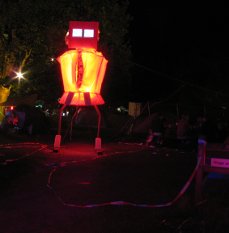 I just turned away from the lock-picking talk, as the tent was absolutely packed (me being 5 minutes late). I don’t know how many people fit in these convention tents, hundreds, perhaps thousands, but that is the amount of people that after tonight may know how to break every lock you own.
I just turned away from the lock-picking talk, as the tent was absolutely packed (me being 5 minutes late). I don’t know how many people fit in these convention tents, hundreds, perhaps thousands, but that is the amount of people that after tonight may know how to break every lock you own.
Earlier today I was at the talk with possibly the smallest amount of listeners of this 4-day exercise, you might even say the attendants resembled Cantor Dust. OK, lousy statistical jokes aside, this talk was by statistician Richard Gill of the University of Leiden and dealt with the Lucia de Berk case.
I had heard of the case before. In 2001, a nurse from The Hague was accused of having murdered dozens of patients, and the strange thing was that most of her guilt was determined by statistics: she had been near the victims at the time of their deaths, and although a direct link with the accused in the form of a confession or evidence could not be established, the court found that the statistical likelihood of her being near all these victims at the time of death was so minute, she must have done it.
At the time I thought this reasoning seemed silly, but I have learned early on in life never to argue with statisticians. So imagine my surprise: here was a statician who argued that the court’s reason had indeed been extremely silly, and that an innocent woman had gone to jail.
I won’t bore you with repeating the entire lecture: author Maarten ‘t Hart summarized Gill’s position excellently in this article from NRC (Dutch). Gill’s paper on how likely the chance is that a nurse was on active duty during all deaths concludes that one in nine nurses would have gone to jail (PDF).
(more…)
 Hans Bauer from Groningen must remove 5,000 books from his home, after a court agreed with housing corporation Patrimonium last Tuesday that his library constitutes a fire hazard.
Hans Bauer from Groningen must remove 5,000 books from his home, after a court agreed with housing corporation Patrimonium last Tuesday that his library constitutes a fire hazard.
 The verdict is in. Laura Dekker, the girl that wants to set a world record by becoming the
The verdict is in. Laura Dekker, the girl that wants to set a world record by becoming the  I just turned away from the lock-picking talk, as the tent was absolutely packed (me being 5 minutes late). I don’t know how many people fit in these convention tents, hundreds, perhaps thousands, but that is the amount of people that after tonight may know how to break every lock you own.
I just turned away from the lock-picking talk, as the tent was absolutely packed (me being 5 minutes late). I don’t know how many people fit in these convention tents, hundreds, perhaps thousands, but that is the amount of people that after tonight may know how to break every lock you own. Remember
Remember  If you want to fire staff you have to go through the courts, a costly process, and a judge may deny your request altogether.
If you want to fire staff you have to go through the courts, a costly process, and a judge may deny your request altogether.  A 56-year-old Dutch woman, Anna B. as she calls herself, was caught smuggling 8 kilos of “very good Dutch weed” into Italy, two years ago. Her lawyer managed to make it so that after a few months she could spend the rest of her 3 year 4 month sentence under house arrest. Friends got her an apartment in what appears to be a very idyllic village in Lombardia, and another stroke of luck made it so that she got two hours a day to go to the supermarket, time she uses to go hiking.
A 56-year-old Dutch woman, Anna B. as she calls herself, was caught smuggling 8 kilos of “very good Dutch weed” into Italy, two years ago. Her lawyer managed to make it so that after a few months she could spend the rest of her 3 year 4 month sentence under house arrest. Friends got her an apartment in what appears to be a very idyllic village in Lombardia, and another stroke of luck made it so that she got two hours a day to go to the supermarket, time she uses to go hiking. Two burglars from Dordrecht have to pay a child 93 euro in damages, a local court decided. After the burglars broke into the child’s home, the child was afraid to sleep in its own bed for fear of the criminals returning,
Two burglars from Dordrecht have to pay a child 93 euro in damages, a local court decided. After the burglars broke into the child’s home, the child was afraid to sleep in its own bed for fear of the criminals returning,  In a case that at its surface did not seem to have much to do with the legality of downloading music and films, a three-headed court in The Hague has declared that
In a case that at its surface did not seem to have much to do with the legality of downloading music and films, a three-headed court in The Hague has declared that  A court in Breda has found that Tilburg priest Harm Schilder is allowed to harass his neighbours by
A court in Breda has found that Tilburg priest Harm Schilder is allowed to harass his neighbours by